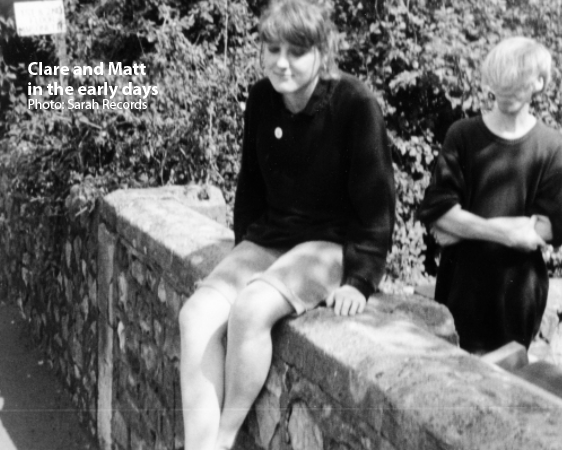Did you know there once was an international record label based in a tiny flat opposite the Clifton Downs? This month, local author Jane Duffus is publishing book celebrating the significance of Sarah Records, the most independent of indie labels
SARAH Records was the Bristol-based indie label that signed the acts no major label would touch but who you wanted to hear. It put out a board game, produced cut’n’paste fanzines and stuck two fingers up to the mainstream music industry. It was your secret world and it was located here from 1987 to 1995.
Based first in a tiny Clifton flat and later in a house overlooking Bedminster train station, Sarah’s co-founders Clare Wadd and Matt Haynes were driven by feminism, ethics and a passion to truly embrace the DIY ethos of the post-punk scene. And fans were drawn to the label right from day one.
Clare and Matt were not concerned with forming a capitalist monolith to rival Virgin or EMI. Instead, they were eschewing the posturing and vanity of the pop charts and focusing on promoting the kind of bands that the major labels would be too scared to touch. When Sarah launched in November 1987, Clare was 19 and still at university, while Matt was 25 and a physics graduate who had been working as a car park attendant. The couple lived in a rented basement at 46 Upper Belgrave Road opposite the Clifton Downs and were scrimping to make ends meet.
“I remember spending the summer of 1987 walking around Clifton village and it was endless sunshine, which sounds unlikely, planning out what we were going to do,” says Clare. “And it wasn’t like we had a plan that we were going to do 100 7″ singles and then throw a big party but we always knew we wanted to do more than one, we weren’t just putting a record out, we were starting a record label. I think right at the start we always knew that fanzines would be a part of it and they’d be our contribution and the equal to records, maybe the written version of a 7″ single.”
Bristol’s Subway Organization was an influence on Clare and Matt’s thinking that it would be possible to run a record label from the South West rather than London, and they admit that asking Subway’s Martin Whitehead for advice might have been the smart thing to do.
“I’m sure he’d have given of his time freely and been really brilliant, but we never even spoke to him about it,” says Matt.
During an interview on Radio 1 in 1992, Clare confirmed that part of the impetus for setting up Sarah was “we looked at other record labels and thought, ‘No, they’re all doing it wrong, we can do it better’. So that was a motivation as well, we wanted to do it from the fan’s point of view.”
The terms of their rental meant that Clare and Matt were not supposed to be running a business from the residence – although they later found out that their landlord’s agent had known all along that they were doing so from the property and he couldn’t have cared less. One clue might have come on the day that Clare and Matt accidentally set fire to the kitchen when they went out to collect records from the warehouse for sleeving, having forgotten that the oven was still on with the grill pan inside. Clare and Matt returned from the warehouse in two taxis, unloaded boxes of records onto the pavement, and watched in horror as smoke billowed out of their home while the Fire Brigade dealt with everything. And the agent looked on…
Sometimes strange things happened while working from home. “We heard Shadow Factory coming through the wall once before we released it and it completely freaked us out. No one had a copy so how could we be hearing it through the wall?” says Clare. Their next door neighbour turned out to be Mike Gartside, who was the indie music writer at Bristol’s listings magazine Venue. Mike had taken his promotional copy of Shadow Factory home to review.
“I looked at the address at the bottom of the record and was like, ‘That’s next door to me!’ It was a real shock,” remembers Mike. “I was at No 45, and the partition between the two walls was practically non-existent, so I could put on a record in my flat and I’m sure they heard it almost perfectly in theirs. I deliberately put it on loud so they couldn’t possibly not hear it.”
When Mike decided to move on, Clare and Matt jumped at the chance to upgrade to the slightly bigger premises. Moving day fuss was kept to a minimum since everything was transported internally, via a door in Mike’s bathroom that linked the two flats together.
In April 1992, buoyed by a few healthy cheques from albums, Clare and Matt decided to do the grown-up thing and buy a house. They moved to the only house they viewed: 31 Gwilliam Street in Windmill Hill.
Although Clare and Matt moved to London after they decided to close Sarah in August 1995, they remain enormously fond of Bristol. “If I wasn’t living in London, Bristol would still be my top city to live in,” promises Matt. “Bristol is lovely because it’s a self-contained big city. You can stand on Brandon Hill and there’s greenery all around. So even though you’re in a big metropolis, it doesn’t take ages to get out.”
These Things Happen: The Sarah Records Story by Jane Duffus, is published by Tangent Books. For information, visit tangentbooks.co.uk and janeduffus.com


